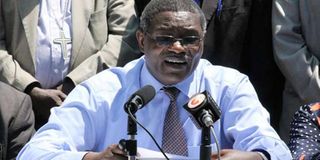Churches warn against foreign influence in school curriculum reform

Secretary-General Peter Karanja addresses the National Council Churches of Kenya annual general assembly at Jumuia Resort in Kilifi County on August 13, 2015. Churches have thrown their weight behind the ongoing school curriculum reform. PHOTO | WACHIRA MWANGI |
What you need to know:
- The clergy proposed the curriculum should have clearly defined and strong sustainable financing with identifiable funding organisations “who declare non-interest in the country’s values."
- Among those who attended the consultative talks with Dr Matiang’i were Cardinal John Njue and NCCK Secretary General Canon Karanja.
- Dr Matiang’i announced he will establish a scheme for the office of chaplaincy in all schools with the government paying the chaplains.
Churches have thrown their weight behind the ongoing school curriculum reform.
However, the churches called for inclusion of home-grown positive values in the curriculum and warned against any efforts by foreign groups to force alien values into the curriculum.
At a consultative meeting with Education Cabinet Secretary Fred Matiang’i, Catholic bishops and other clergy under the umbrella of the National Council of Churches of Kenya (NCCK) termed the reforms as necessary.
“The curriculum reforms are necessary and timely to effectively serve the needs of the country,” said a statement presented to Dr Matiang’i.
Among those who attended the consultative talks with Dr Matiang’i were Cardinal John Njue and NCCK Secretary Canon Karanja.
“Religious-based positive socio-cultural values alongside others must be clearly included in the curriculum,” they said.
They also urged Dr Matiang’i to ensure that thorough consultations are held with all key players to ensure that there is consensus from all interest groups.
“Universities are critical at this point; they produce the graduates who deliver the curriculum at the school level,” the statement said.
SUSTAINABLE FINANCING
The clergy also proposed that the curriculum should have clearly defined and strong sustainable financing with identifiable funding organisations “who declare non-interest in the country’s values."
In the reform process, the statement added, teachers must be involved adequately.
“They (teachers) should be adequately retrained and motivated before and during implementation,” the document said.
The churches also proposed a two-year piloting process for the new curriculum to ensure it was effective.
Dr Matiang’i announced he will establish a scheme for the office of chaplaincy in all schools with the government paying the chaplains.
He said there will be adequate time to pilot the new curriculum once it is ready, adding that many partners were being consulted.
Already, he said, he had formed a national steering committee with representatives from all sectors that was currently driving the review process.
Currently, experts from the Kenya Institute of Curriculum Development and universities are drafting the framework of the new curriculum which will be tabled before a national conference in July for ratification.
30 YEARS AGO
Dr Matiang’i said the curriculum was last reformed more than 30 years ago hence the justification for the reform.
A report on Needs Assessment Study for Curriculum Reforms, which were conducted by the Kenya Institute of Curriculum Development (KICD) indicate that Kenyans want an education system that will put more emphasis on skills as opposed to theory and examinations.
The first three tiers of the system comprise five years of early childhood and lower primary education; six years for middle primary and lower secondary; and three years for upper secondary.
However, the years for tertiary education have not been agreed upon and awaits further consultations, especially with universities and higher institutions.
If approved, the new system of education will replace the current 8-4-4 system, which has been in place since 1985.
The 8-4-4 system has been widely criticised for being expansive, heavily loaded in terms of content and too examination-oriented, which when combined, put undue pressure on the learners.




